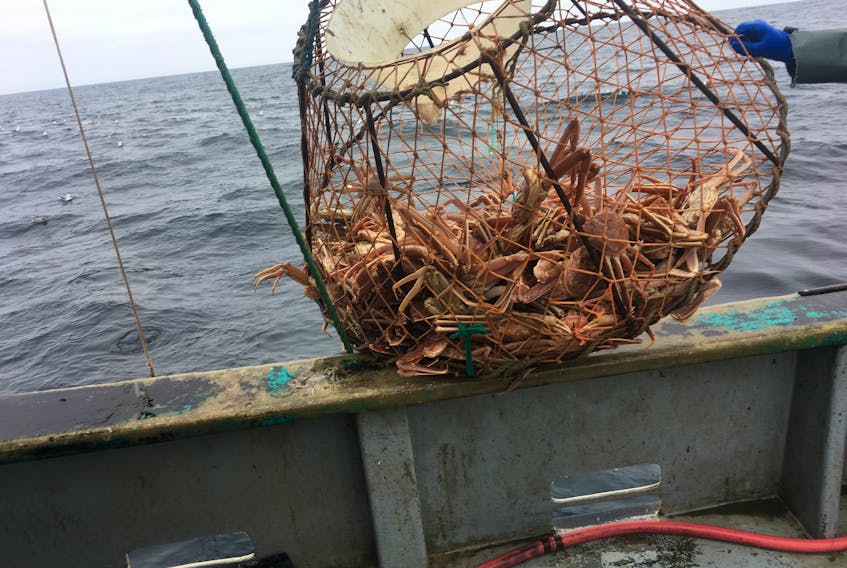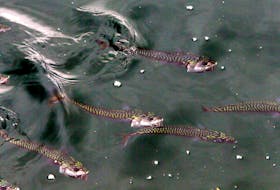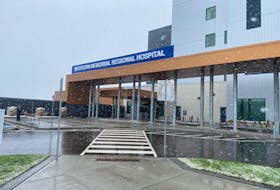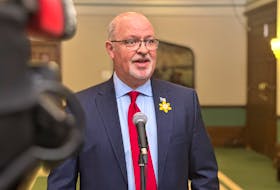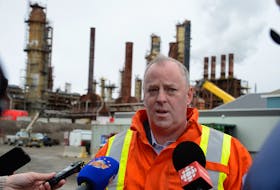ST. JOHN'S, N.L. — The union representing fish harvesters in Newfoundland and Labrador says seafood processors are hurting their ability to negotiate a good price for snow crab and haven't fully addressed worker safety in the fish plants. The head of the Association of Seafood Producers (ASP) claims the union is simply using COVID-19 as a bargaining tactic.
It remains to be seen whether harvesters in the province will eventually start fishing for crab and offloading it at plants for processing. According to the Fish, Food and Allied Workers (FFAW-Unifor), two vessels from outside the province were turned away in Port Aux Basques and denied the opportunity to offload crab as of Monday morning, and three transport trucks carrying crab harvested outside the province were being blocked from making deliveries to fish plants — two in South Brook and one at Goobies.
A Change.org online petition asking the provincial government to prevent local plants from processing snow crab harvested elsewhere had received more than 3,700 signatures as of late Monday afternoon.
Greg Pretty, industrial director for the union, told The Telegram that processing companies bringing in outside product are doing so as a ploy to get cheap product.
"The fishery was postponed three times on health and safety issues," Pretty said. "During that time, the bargaining for the price of crab should have progressed, but instead of progressing, they seized the opportunity, stopped bargaining and said, let's bring in crab from outside of Newfoundland and let's get that into the plants. Thereby, with the Newfoundland fishery closed, they'll suppress the prices for crab."
ASP executive director Derek Butler said it is not unprecedented for seafood producers to bring in snow crab from outside the province for processing. He said the processors want a date for the fishery to open in Newfoundland and Labrador.
"It happens almost every year in recent years," Butler said. "As the volumes of crab in Newfoundland and Labrador have gone down in terms of quota, different producers have brought in product from outside the province."
The snow crab season in Newfoundland and Labrador has so far been delayed multiple times. The union claims processors are getting fish plants up and running without fully addressing safety issues for workers. FFAW-Unifor has specifically cited a move away from ensuring N95 masks are used in the plants as a contentious issues for the union.
"There's more apprehension in the plant workers than I've ever seen in my life," said Pretty. "This is an issue of life and death, and yet the companies are saying, 'Well, we've done all the right things. Go in.' Our position on that is it hasn't been done properly. The occupational health and safety issues need to be addressed before we can start the fishery. They've resisted that."
Butler said the processors were understanding when it came to the initial delays, as there were matters to iron out to address safety in the plants. But he said a lot of work has since gone into establishing standard operating procedures that address the needs of occupational health and safety.
"We've done that, and despite the fact we've done that — and that's been done now for about three weeks — the FFAW continues to go public with misinformation," Butler said. "And I think it's deliberate. To say that the plants are not safe … is like saying Occupational Health and Safety in the province is not up to its job and that the chief medical officer of health is wrong."
Plant workers
In a news release issued Monday, Ocean Choice International (OCI) said it has a plan in place to address COVID-19 that provincial Occupational Health and Safety reviewed and accepted and that an orientation on that plan took place at all OCI plants last week. The release said the company got a clear message from workers during the orientations that they want to get back to work and quoted two workers from its Triton plant that backed this up.
“I have to admit that I was feeling uneasy about the plant opening for the season given the ongoing pandemic,” longtime plant worker Jane Fudge stated in the release. “Once I had the opportunity to see the preventative measures and all of the additional safety processes Ocean Choice has put in place to help keep me and my fellow co-workers safe, I am ready to get to work."
Pretty referred to masks OCI is reportedly using as a "substandard dust mask" suitable for air pollution but not capable of providing the sort of protection N95 masks can offer.
"It's awful that a company, that a group of companies, can either knowingly or unknowingly take a stand that what they've done is good enough, when they've done, really, nothing to ensure the health of processing workers," he said.
In a statement issued to The Telegram, Service NL said that while Occupational Health and Safety does inspect workplaces to ensure compliance with OHS legislation and health orders issued by the chief medical officer of health, it does not approve plans.
"Compliance to the OHS legislation will be determined during a site inspection by an OHS officer," Service NL stated.
The statement went on to note WorkplaceNL has worked with fish plants on ways to address respiratory protection, safety certification training, emergency response planning for COVID-19, sanitation protocols, and fit-for-duty screening.
"In situations where workers cannot work two metres (six feet) apart, the employer must conduct an appropriate risk assessment. In these cases, wearing a non-medical mask is possible, but is not a replacement for following proven measures such as handwashing and physical distancing. WorkplaceNL also provides occupational hygiene services to help plants develop their safe work practices and protocols to protect workers from exposure to infectious disease, and continues to provide education and advisory services to help plants operate safely, taking into consideration direction from public health authorities."
On Saturday, the federal government announced plans for a $62-million Canadian Seafood Stabilization Fund that can be used for increasing storage capacity for unsold product and complying with new health and safety measures. Butler was not aware yet of how processors in Newfoundland and Labrador will potentially make use of these funds but said its existence is good news for the industry.
"The expenditures have been significant to gear up for COVID-19 to make the plants safer," he said, noting the details of how companies can apply for funding has not been announced.
@CBNAndrew

